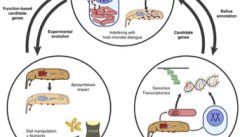
More than just a shell: the cuticle links insects nutrient needs to regulation of their associated microbes
Aurélien Vigneron (UCB Lyon 1, LEM), invité par l'équipe MTSB
Interactions between host and microbial partners -both parasites or mutualists- have a major impact on organisms’ fitness and thus constitute a driving force in species evolution. For instance, insects are widely associated with endosymbiotic microbes, from which they usually get nutritional supplementation to cope with the lack of diversity in their diet. While major progresses have been made in understanding the long-term stability of insect endosymbioses, whether and how the host can modulate the density of its associated microbes in response to acute nutritional stresses is still puzzling.
A significant number of crop pest beetles, such as the cereal weevils Stophilus spp. and the saw-toothed grain beetles Oryzaephilus spp., are associated with intracellular mutualistic bacteria. Those endosymbionts support their host by providing vitamins and amino acids that foster cuticle synthesis. Using a combination of diet manipulation and gene knock-down, we revealed that a coordinated molecular cross-talk between metabolic and cellular processes drives tolerance, solicitation, or recycling of endosymbionts, depending on the host’s needs in aromatic amino acids, which are especially acute during the completion of the insect cuticle synthesis.
Additional informations
-
Amphi Lwoff (Lwoff+0)

